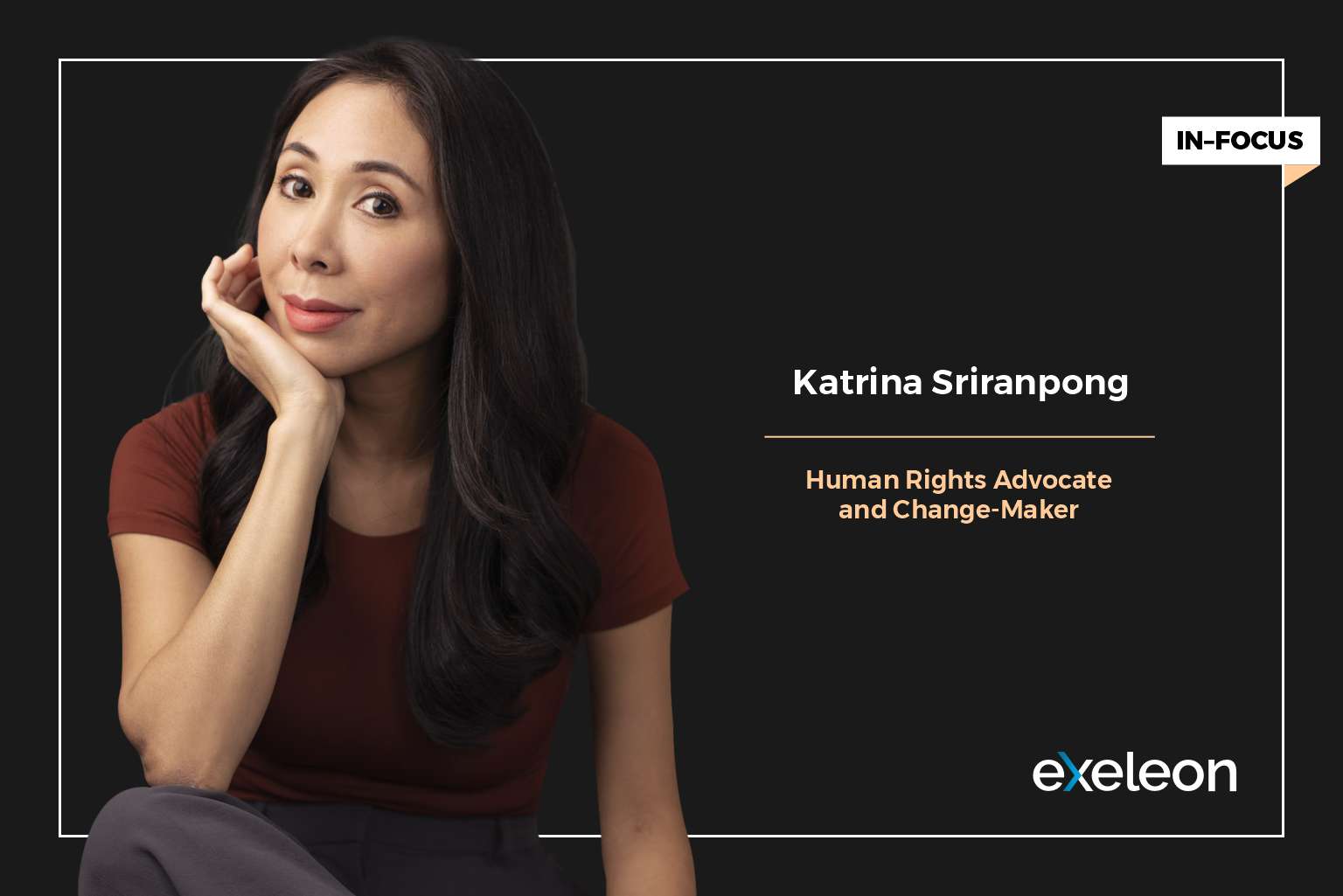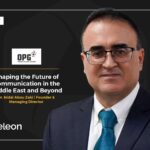
Despite which walk of life you come from, everyone has the power to make a difference – this is the philosophy Katrina Sriranpong has followed from her career as a legal entrepreneur to her full-time pursuit of philanthropy and activism.
Katrina Sriranpong is a social advocate who has made her lifelong mission to make a positive change in the world. Formerly the only Thai-speaking lawyer in her home of Vancouver, British Columbia, she spent a significant portion of her career assisting immigrants and refugees navigate complex Canadian law and policy. As a lawyer, she has represented human rights activists from Syria and Ukraine in claiming refugee protection in Canada as well as other refugee claimants from India, Pakistan, Turkey, Mexico, El Salvador, Honduras, Somalia, Botswana and Albania. She also provided free legal advice to low-income migrant workers at risk of labour exploitation and victims of human trafficking. Sriranpong has a deep interest in assisting vulnerable populations as well as advocating for the rights of children in conflict-affected regions and supports programs aimed at rehabilitation, education and developmental aid for children.
Today, in consideration of the on-going conflict between Israel and Gaza, we will discuss the topic of human rights and explore activisms in the current generation.
What are your thoughts regarding the current conflict between Israel and Gaza?
Katrina Sriranpong: I am extremely saddened by the October 7, 2023, attack on innocent Israeli civilians, including children. I am also equally saddened for the retributive bombings over one of the most densely populated cities in the world, Gaza, with over 2 million innocent Palestinian civilians, half of whom are children.
It’s crucial to give context to have a complete understanding of the situation. Israel has been committing very serious human rights violations against Palestinians for decades, which has been documented by international rights groups such as Amnesty International and Human Rights Watch. For the last 75 years, Palestinians have lived under oppression and brutality. 75 years ago, more than 750,000 Palestinians became refugees, almost overnight. This mass displacement of people from their ancestral land in order to create Israel is known as the Nakba (meaning catastrophe in Arabic). Approximately 15,000 Palestinians, including women and children, were killed by the Zionist military forces in the massacres.
After the Six-Day War in 1967, Israel illegally occupied East Jerusalem and the West Bank. Since then, Palestinians have been targeted by Israeli authorities who use discriminatory laws to steal Palestinian land by forced evictions and demolish their homes so the land can be given to Jewish Israelis. They have to live in constant fear of losing their home. Their life is filled with human rights abuses and daily discrimination.
More recently, Gaza was referred to as the world’s largest “open-air prison.” Since 2007, Israel has deprived more than two million residents of Gaza an opportunity to a better life. Israel’s closure policy blocks most Gaza residents from travelling to the West Bank, prevents travelling abroad via Israel, restricts their rights to work and an education and prevents residents from pursuing opportunities within Palestine. Israel continues to control Gaza’s territorial waters, airspace, and the movement of people and goods, except where Gaza borders with Egypt.
When Palestinians tried to organize a peaceful protest (the “Great March of Return” from 2018 to 2019), over 200 unarmed protestors were killed with snipers (including 40 children) and over 8000 were injured by bullets and over 150 had to have their limbs amputated.
Palestinians are arrested, detained, and tortured without charge for an indefinite period of time, which is allowed under Israeli military law. The minimum age of criminal responsibility is only 12 years old. According to Human Rights Watch, detention can be renewed indefinitely based on secret information, which the detainee is not even allowed to see. Many children are detained, tortured, and kept from seeing their families simply for throwing rocks at Israeli soldiers. Israel is the only country in the world that systematically prosecutes children in military courts, which lack fundamental fair trial rights and protection.
Of course, I want to emphasize that the actions by the Hamas on October 7, 2023, were horrific and inexcusable. However, demonstrating support for the innocent civilians of Gaza and support for Palestinian liberation should not be seen as supporting Hamas or antisemitic. It is not simply about religion, but the violation of human rights. Harvard’s former executive director of Harvard Hillel, the University’s Jewish Center, Mr. Bernie Steinberg, stated “for the safety of Jews and Palestinians, stop weaponizing antisemitism.” As a leader in the Jewish community, he argues there is currently a cynical weaponizing of antisemitism by powerful forces who desire to intimidate and silence legitimate criticism of Israel and American policy on Israel. This takes place in the form of bullying pro-Palestine organizers and anyone that does not show deference. Steinberg makes his position clear by stating that “it is not antisemitic to demand justice for all Palestinians living in their ancestral lands.” He goes on to explain that if Israel’s case requires categorizing its critics as antisemitic, then it has already admitted defeat. This does not imply that antisemitism does not exist, it simply means that it cannot be used to silence dissent of Israeli policies. Fabricating fair criticism of Israeli policies as antisemitic also undermines the fight against genuine antisemitism in the world.
Unfortunately, Israel has criticized Amnesty International as “biased” and a spokesperson for the Israeli Ministry of Foreign Affairs has stated publicly that “Amnesty International is an antisemitic organization” simply because they claimed war crimes had been committed by “all parties.” Amnesty International has also labelled Israel’s treatment of Palestinians as apartheid and a cruel system of domination and a crime against humanity. The United Nations has even been labelled as antisemitic simply because they demand a ceasefire to prevent further civilian casualties.
It’s important to understand that the laws in Israel are designed to discriminate and dispossess Palestinians of their land and repress any dissent. This is an apartheid as confirmed by every major international human rights organization including the United Nations. It violates international law and breaches human rights. Palestinians want a two-state solution. Netanyahu said, “Israel is not a state of all its citizens [but rather] the nation-state of the Jewish people and only them.” Regarding the current war on Hamas, the queen of Jordan stated that you can kill the combatants, but not the cause. There must be an end to oppression and apartheid. Where there is oppression, there will always be resistance.
How are human rights being affected during the war?
Katrina Sriranpong: During an armed conflict, the respect for human rights becomes even more essential. Children still have the right to attend school during war and people still have the right to healthcare, food and clean water. The states involved still have a duty to respect and protect the rights of all individuals. Certain human rights are so important that they can never be suspended or changed, even during an armed conflict. For example, the right to life, prohibition against torture, prohibition against slavery, requirements of a fair trial, freedom of thought, conscience and religion or your belief, prohibitions against taking hostages, and medical care as well as access to food, shelter, and safe water are essential human rights.
Therefore, even in times of war, states are bound by human rights duties. However, in times of war, other laws will begin to apply to regulate all parties: international humanitarian law. International humanitarian law are a set of rules to protect civilians or people who are no longer taking part in the fighting or hostilities. It’s also important to emphasize that international humanitarian law are non-reciprocal, meaning that the violation of these rules by one party does not justify the opposing side breaking their own obligations under international humanitarian law.
International humanitarian law outlines for the protection of civilians, children, hospitals, and schools. It also requires parties to respect the principle of proportionality, where the harm caused to civilians because of a military attack should not be excessive in relation to the direct military advantage expected. In other words, disproportionate attacks is considered a war crime. Further, international humanitarian law requires the parties to abide by the principle of distinction, where they must ensure targets are military and not civilian. Attacks on civilians such as doctors, humanitarian aid workers, journalists and children as well as civilian objects are considered war crimes.
Israel instructed 1.1 million people who lived in the North of Gaza to evacuate during intense bombings while cutting off electricity, food, water, fuel and humanitarian assistance. They violated international humanitarian law. These evacuation orders against whole cities or regions are not considered effective. Israel disregarded the obligation to distinguish between military objectives and civilian objects as well as the prohibition on indiscriminate attacks. These “evacuations” are a form of collective punishment and violates international humanitarian law, which may amount to war crimes.
Human Rights Watch has also documented the use of white phosphorus by Israel in Gaza, which is not allowed to be used at or in close proximity to populated civilian regions. White phosphorus creates a dense smoke screen and causes excruciating burns putting civilians at risk of serious and long-term injuries. The use of white phosphorus by Israel in such a densely populated area magnifies the risk of civilian casualties and injuries and violates international humanitarian law.
Also, evacuating civilians from a region with the intent to clearing the area and preventing residents to return home after the conflict is considered a war crime and crimes against humanity. In other words, if the people of Gaza choose to leave their home during the war, they must be allowed to return. Understandably, many civilians in Gaza are worried they may not be able to return home as they were forcefully displaced in the Nakba of 1947 to 1949. I think the world needs to keep a close eye on this situation to ensure it does not happen again.
UNICEF official, Mr. James Elder, reported the hidden danger of “safe zones” in Gaza”. For safe zones to be safe, they must, by law, provide water, food, shelter, and medical supplies. Also, UN’s child relief agency stressed that for safe zones to provide protection, people have to be able to safety get to them. Unfortunately, throughout the war on Gaza, the Israeli military has repeatedly instructed Palestinians to evacuate to these “safe zones,” and then later bomb those areas as well as the evacuation routes. As a result, UNICEF believes that only a ceasefire can save the children as there is no safe place in Gaza.
Recently, Amnesty International’s investigation has revealed that there were no military objectives on some sites that were bombed, which raises concerns that some strikes were direct attacks on civilians or on civilian objects. Further, Amnesty International argues that indiscriminate attacks or direct attacks on civilians or civilian objects must be investigated as war crimes. In addition, starvation is being used as a weapon of war against Gaza civilians. Hospitals have also been targeted, preventing thousands from getting life-saving medical care. The Washington Post found there was no evidence behind Israel’s assertion that Hamas used Al-Shifa hospital as a command center. A New York Times investigation confirmed that Israel bombed safe zones where it told civilians to evacuate. Forensic Architecture, a research agency based at the University of London investigating human rights violations around the world, revealed that hospitals in Gaza were being systematically targeted by Israel.
Over a thousand children in Gaza have had their limbs amputated without anesthesia due to the lack of medical care. Gaza has been turned into a slaughter house in this military mismatch. To date (December 2023), over 20,000 Palestinians have been killed, with approximately 8,800 of them being children and 6,300 of them being women. However, there is more than 7,000 missing and believed to be under the rubble.
Mr. Craig Mokhiber, former Director of the NY Office of the UN High Commissioner for Human Rights wrote that the situation in Gaza is a “text-book case of genocide.” He argued the “European, ethno-nationalist, settler colonial project in Palestine has entered its final phase” toward the expedited destruction of the last indigenous Palestinian life in Palestine. He found it horrific that the United States, the United Kingdom, and much of Europe was complicit to this assault. These countries are not only refusing to meet their obligations for the Geneva Conventions, but they are actually providing financial support, intelligence, and political cover for Israel’s atrocities while Israel is committing war crimes.
Israel has publicly stated their intent to kill innocent civilians, which has been well documented. Meirav Ben-Ari, an Israeli politician, said, “The children of Gaza have brought this upon themselves,” and Daniel Hagari, Israel Defence Forces Admiral and IDF spokesperson, said, “The emphasis is on damage and not accuracy.” As the former UN High Commissioner for Human Rights stated, usually the most difficult part about proving genocide is intent because there has to be an intent to destroy in whole, or in part, a particular group. But, in this case, the Israeli government’s intent has been publicly and explicitly stated by the prime minister, by the president, by senior politicians, and by their military leaders. It’s on public record and therefore very easy to prove.
I believe that Palestine is a daily test for the conscience of the world. Genocide is not self-defence and genocide can only persist through silence. By sharing information, you spark conversation and encourage people to awaken their moral conscience, compelling them to speak up and advocate for humanity.
How do you think the voice of the younger generation is affecting our society in consideration of the current situation?
Katrina Sriranpong: Well, when we discuss the voice of the younger generation, it’s important to understand the impact of the digital age, which has significantly affected the spread of information and the ability to mobilize a cause. The digital age has changed social activism forever.
I define myself as a millennial as I was the first generation to grow up with the internet. We’re considered the first global generation and heavily rely on the internet, mobile devices and social media. Digital technology has had a dramatic impact on political engagement. Ordinary people can be a catalyst for social change and participate in the political process well beyond voting. They can mobilize others to get involved by sharing information, raise funds for a specific movement, and organize protests. However, the digital environment comes with consequences that we must all be aware of such as “fake news,” misinformation, disinformation, and hate speech, which is common in the digital public sphere. For instance, Israeli social media space has been a breeding ground for anti-Palestinian movement referring to Palestinians as “animals” or “dogs” without the historical context. The IDF is posting their own killings, showing bodies, to gain support for their lack of progress in the war. Whereas the same videos may be used to document war crimes.
The war in Gaza has been a significant point for the media ecosystem. Social media allows us to see the brutality and genocide of innocent civilians in Gaza, many of them children, directly from the source. Families in Gaza are sharing personal stories of pain and suffering as well as journalists on the ground covering the atrocities, and being targeted by Israel for doing so, as reported by Amnesty International in December 2023.
The younger generation has learned to question and be critical of sources of information. The complicity of so many Western news outlets are being realized as they have been repeatedly exposed for failing to question Israeli propaganda before spreading the disinformation. There is an abundance of disinformation published to defend the indefensible. Although Israel is a democratic country, there has always been a severe limit to free speech of pro-Palestinian views. Israel has also imposed communication blackouts in Gaza, which prevents people from sharing and documenting human rights violations such as disproportionate force by the military. Imposing internet shutdowns and restrictions are a human rights issue.
Currently, over 80 percent of democratic voters in the U.S. want a ceasefire and the younger generation feel that politicians are not listening to their concerns. The younger generation is also cognizant of the fact that weaponizing antisemitism has become part of a political game to silence dissent. Younger Canadians are more inclined to view Israel’s offensive in Gaza as excessive and disproportional. Social media influencers have provided our generation with a new unfiltered lens on the Gaza war. They become the media with the power of their phone to influence millions. They help to shape the narratives and significantly changed our understanding and perception on wars and conflicts. Social media platforms provide a new perspective of real-time, unfiltered content that is immediate, uncensored and often very raw. These platforms such as Instagram, Snapchat and TikTok allow viewers worldwide to witness conflicts through a different viewpoint that traditional media does not cover. This change has revolutionized grassroots-level narrative and activisms.
For instance, Jewish Voices for Peace has had a strong presence on social media and has increased the amount of followers exponentially in the last several years. They are the largest progressive Jewish anti-Zionist organization in the world. They focus on grassroots movements to support the Palestinian struggle for freedom. Zionism suggest that Jews require a supremacist nation state to secure the safety of all Jews. However, Jewish Voices for Peace argue that Jews belong everywhere in the world and should be safe. They advocate that real safety does not grow from guns, checkpoints, walls or a military state. They believe true safety for Jews is built by forging real solidarity with all those fighting for a more liberated world.
In 1997, Nelson Mandela said, “We know too well that our freedom is incomplete without the freedom of the Palestinians.” He was a change maker. However, I would define a change maker as anyone who is willing to implement and advocate for change regardless of the consequences it may entail. These may include bloggers, scholar-activists, and social media influencers who are able to shape the narrative of Israel’s war on Gaza and expose the truth of the systemic oppression, domination, dispossession over five decades of occupation, the 16-year blockade on Gaza, the apartheid regime, human rights abuses, and war crimes. The crimes committed by Palestinian armed groups on October 7, 2023 cannot justify Israel’s collective punishment of indiscriminate or disproportionate bombing of innocent civilians in Gaza, half of them being children. There is no justification for war crimes.









